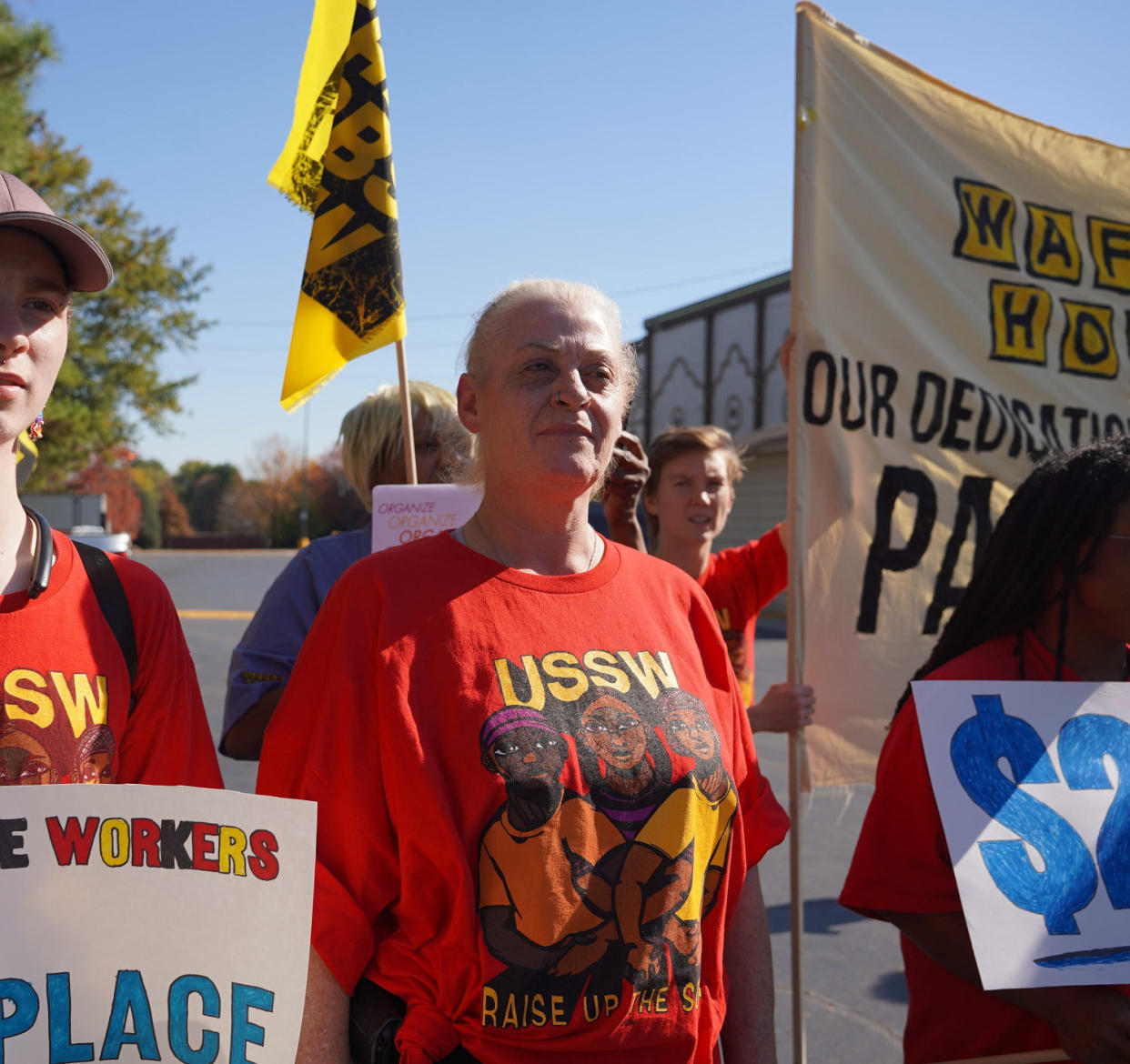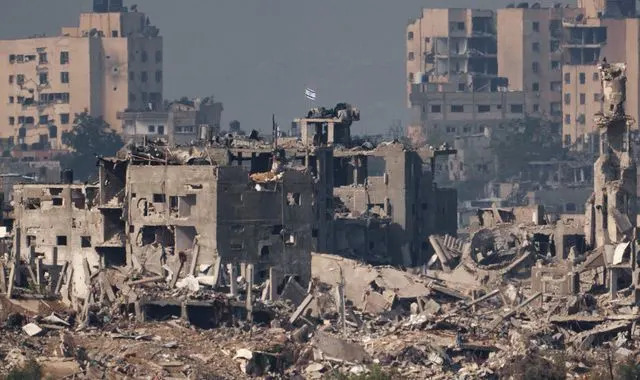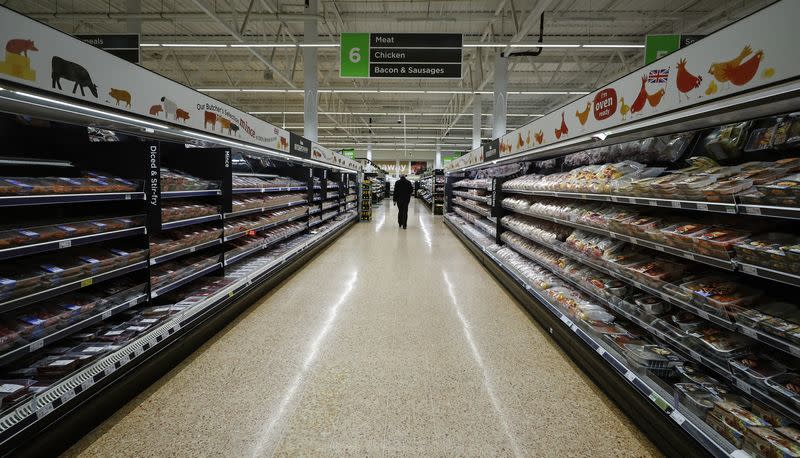Waffle House charges employees for food — even if they don’t eat it
JOSEPH LAMOUR
November 16, 2023
Waffle House workers are asking their employer to end a long-standing policy that regularly docks their paychecks.
On Nov. 8, a coalition of Waffle House workers and supporters delivered nearly 13,000 signed petitions from Waffle House workers, service workers and other allies to Waffle House’s headquarters in Norcross, Georgia.
As first reported by The Messenger, Waffle House workers delivered their demands with support from Raise Up The South, also known as Union of Southern Service Workers, which is being built by service workers to combat low wages and improve working conditions.
“Waffle House workers from across the South are fed up. We’re sick and tired of making poverty wages, the constant threat of in-store violence, and mandatory meal deductions — whether we eat a meal or not while on a shift,” reads the beginning of the petition. “We refuse to be exploited — and so we’re getting organized.”
Waffle House did not respond to a request for comment on this story, but told The Post and Courier, “Waffle House is proud of its long record of effectively addressing any concerns our Associates report to us. We intend to do that directly with our Associates.”
Cindy Smith, a 29-year veteran of the chain who works in Georgia, was part of the coalition of workers present for the delivery of demands.

Waffle House employees (Courtesy Union of Southern Service Workers)
Smith says Waffle House’s mandatory meal deduction policy, which takes a portion of every employee’s pay for meals — whether or not the employee eats anything — has been part of her time at the restaurant for as long as she’s been an employee.
“The meal deductions have always been taken out, but it was only like $1.50 per shift. Then they decided to start bumping it up,” Smith tells TODAY.com, adding that workers weren’t notified about any changes. “Every day that you work now, it is $3.75 that comes out of your check. That’s more than I make an hour.”

Waffle House employees (Courtesy Union of Southern Service Workers)
Smith, who makes $2.92 an hour plus tips at the chain, says the fee is doubled if employees work a double shift whether or not they eat. “85 to 95% of us don’t even eat the Waffle House food. We’re still having to pay for it,” she says. (Georgia’s minimum wage for tipped workers is $2.13.)
Other employees say their Waffle House locations take different amounts. Dreanna Colvin says her store deducts $3.15 a shift, and Gerald Green told The Messenger he paid $39 in three weeks for food he never consumed.
“I barely have any money to pay any bills,” Smith says. “We can’t even buy groceries.”
In addition to an end to paycheck deductions for meals, asking that the chain instead make it optional for employees to purchase discounted shift meals, Waffle House workers are demanding that Waffle House pay $25 an hour for all workers, cooks and servers, that it provide round-the-clock security and allow workers to weigh in about in-store safety.

Waffle House employees (Courtesy Union of Southern Service Workers)
“At one point, probably 2011, I was robbed at gunpoint,” Smith recalls, adding that safety has been an issue at the chain for a long time. “Waffle House didn’t reach out and I had to work my entire shift.”
Waffle House has made headlines for crimes that have been committed in stores, including physical fights that have sent celebrities to court, robberies and even murder. TikTok is littered with videos of several different melees in stores across the country, including one viral instance that made a star out of a Waffle House worker with quick reflexes.
“It’s the same fights when I used to work third shift. They start fighting in the building and out the door and they’re in the parking lot,” Smith says. “It’s been going on for years.”
Smith says their safety demands also extend to working during natural disasters. Waffle House is known for aiming to stay open 24/7 at all costs, including during hurricanes, floods and more. This reputation inspired FEMA to look to the chain’s locations to see how debilitating a severe weather event is. It was coined the “Waffle House Index” by former FEMA director W. Craig Fugate.
“I worked straight through the hurricane that came through Georgia that put the power out. I worked every single day, drove to and from work, even though we didn’t have any electricity at home,” Smith says of Hurricane Idalia. “During the snowstorms, I was transporting people, they put ‘em up in hotels, just to make sure the employees get to work.”

Waffle House employees (Courtesy Union of Southern Service Workers)
Smith says, the day of the protest, she and the group of ralliers present at Waffle House headquarters were hoping for the best outcome, but they were ultimately disappointed.
“We all stood out there. We were very quiet. We were not rude. We were not disrespectful,” Smith says. “We only sent three people in to deliver 13,000 signed petitions for them to tell us if we did not get off the property, they were going to call the police, and they threw all 13,000 petitions in the trash.”
In terms of next steps, Smith says they’re “hoping to get more people to stand behind us, whether they work for Waffle House or not.”
“Waffle House claims that their associates are family, but you’re letting your family live below poverty levels,” she adds. “We’re starving to death. But we’re still getting up every day and going into work.”
This article was originally published on TODAY.com



















